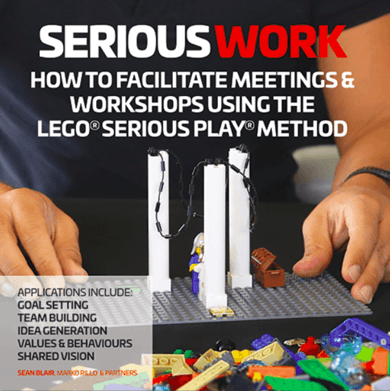Instant LSP or How flexible is the method?
- This topic has 5 replies, 5 voices, and was last updated 8 years, 4 months ago by
 @SeanBlair.
@SeanBlair.
-
AuthorPosts
-
May 19, 2015 at 11:37 am #5405
 Manuel GrasslerParticipant
Manuel GrasslerParticipantHi everyone!
I facilitated a strategy workshop using LSP yesterday and it was a great success! However I found myself in a situation were I could or should have deviated from the plan but I didn’t. I trusted in te process I developed and it worked out great!
But it got me thinking about how flexible LSP is!
The power of the method also lies in the framing of the building questions and the questions the facilitator states in the reflection phase. So it always needs some sort of pre-planning and future-thinking of the facilitator. But what do you do if the workshop topics progress into an area you haven’t anticipated? If the team needs to adress a certain topic which unfolded in during the workshop. Is LSP as powerful if you create the building challenges on the fly to meet the topics? I am not sure and do not have any deep experiences on this.The same question is true for ad-hoc meetings in Business when I feel LSP would help to facilitate a better outcome but when there isn’t the time to prepare a workshop outline. So how do you conquer thos ad-hoc instant situations using LSP?
– Does it come over time and experience?
– Is it even suitable for instant sessions?
– Is it as powerful as with pre-planned well thought challenges?I can see an increasing power in the method using it instantly out of the box. Just grab the bricks and start building with some guidance as it incrases the day-to-day use in the always changing business environment. But I am not sure if it also loses some of its power!
So I’d like to start a discussion here about our experiences and possible new formats which empower instant facilitation!
May 19, 2015 at 12:40 pm #5406 Eli De FriendModerator
Eli De FriendModeratorDear Manuel,
As you were trained by Robert, I am sure that you are currently respecting the principles, process and ethics of the method as much as anyone.When in doubt, stick to what you know.
Regarding improvisation, I fear that it would be quite risky to improvise a building task. I already find it difficult to explain a task, when it is in writing on the projection screen and I repeat it a couple of times. If you want to improvise, why not just use discussion. If you want some tangible outputs, how about a flipchart or post-its?
The main point here is that during your road-map design, you are using Flow Theory and Experiential Learning to develop increasingly challenging exercises that build on each other. Adding something that is out of flow, off-topic, is probably breaking LSP convention. Can you get away with it? Probably depends on your skills as a facilitator and their skills as participants.
I won’t say it can’t or shouldn’t be done, but I would say that as soon as you go outside the boundaries of what has been scientifically proven to work, you risk your own reputation and that of the method.
Let’s see what other people have to say on the topic.
All the best,
Eli
May 19, 2015 at 8:06 pm #5411 Manuel GrasslerParticipant
Manuel GrasslerParticipantThanks for your points Eli,
Well I am definitely a Stick-to-the-Plan guy if it comes to workshops. The power lies in framing the different challenges with the ultimate goal of the workshop in mind.
The suggestions in using flipcharts or stickies is well suitable. And I do not want to compromise the method in any way.
However workshop reality is that there are certain aspects arising in a workshop the facilitator can’t anticipate. As Robert said in his training: Stick to the Plan but have a Plan B – always.
But let’s drive the discussion to the not so vulnerable part of “normal” business meetings like a weekly Jour Fixe.
I can see LSP there in some good use. What could be done is to develop a pre-defined protocol for recurring meetings which participants can adhere to. The challenges need to be open and more generic though – like
“Which topics are currently at your desks?”
“Which decisions are at the table?”
“What are the strengths of this or that?”I guess you get the point.
It is more like a generic standard agenda which is used in recurring meetings anyway.This is just an idea I carried around with me today but how about defining and developing “Standard” challenges for typical business topics discussed or worked on in regular meetings and putting them on facilitation cards teams could use in their meetings. This would mean that the people in the company or adhering to the meeting needs to be trained in using such cards and “improvising” LSP internally.
This could be a new Workshop Format or Product Facilitators can offer their clients if they are willing to adapt LSP for some reasons on a regular basis. Like “LSP Light for Instant Business Meetings” using the Window Exploration Bag.What do you think? And what are your experiences? Anybody?
May 23, 2015 at 5:51 pm #5423 SebastianParticipant
SebastianParticipantHi Manuel,
Re your questions on what I assume are significant deviations from the stated objectives I would say no.
However deviations from the script and workshop ‘activity blocks’ are something I frequently have to do for the following reasons:
1. Unearthed info coming out of the discussion strongly suggests a different set of challenges and it would be very difficult to get all the relevant personnel back together anytime soon.
2. Force Majeure. The workshop has to suddenly be cut by say..2 hours in an 8 hour session due to some internal emergency.
3. What you so beautifully scripted out simply dies not work for some reason and you’re rather certain optimum output would not be achieved.I frequently use LSP ad hoc in meetings with my own team or clients just because I know it would make the meeting nore priductive.
Many times we use LSP with client jyst to figure out how to structure the LSP workshop.
At the end of the day LSP to me is a communication and thinking aid and if you use the basics correctly and are confident and can think on your feet then go for it.. I do and I get repeat business so I must be doing it right somehow.Cheers!
Sebastian.November 27, 2015 at 2:58 am #6194Guy Winterbotham
ParticipantI’ve just come from training and a similar question was asked of Robert. He said ask if the team needs to discuss the issue or move on. If they need to discuss, he leaves to get a cup of coffee. In the example he gave they were done in 30 mins and ready to get back on with the workshop as planned.
Similar newbie questions like do you change the plan on the fly? RR: No, you may leave the framing question open to see what emerges but the flow of applications techniques would remain as designed.We answers are at the moment parroting as I await my first experience facilitating.
November 27, 2015 at 10:15 am #6195 @SeanBlairParticipant
@SeanBlairParticipantGreat thread – thanks for starting Manuel
I have had a couple of unplanned ‘instant’ LSP experiences that have worked well. There is one important pre-condition though… that being that group I’m working with has already been though an LSP workshop with all the usual warmups etc.
Example.
Recently I was working with a client (over 6 months) to help them develop a better leadership culture. About midway though I was facilitating a non-LSP meeting where they were reviewing their business plan. The ‘values’ stated in the plan were not the values I had felt or seen and they looked like a left behind from a previous plan.
I called them on it and said word to the effect – ‘are those REALLY your values…”?
They hesitated.
I said ‘look, lets do a 5 minute LSP intervention to explore your values’ (remember they had the basis LSP skills).
They agreed.
I happened to have in my bag 7 what I call enhanced windows kits, (a windows bag, plus a brown bears river kit mixed in).
I gave them all a bag and asked them to build a model of the KEY value, alive today, needed to deliver their business plan. 2 mins.
They built 7 models (one each) then voted. They 4 values that emerged:

Belief in potential
Respect for each other
Inclusivity
Learning & growingWere spot on for their organization, and VERY different from the set originally in the plan.
5 mins unplanned, set up on the fly, delivered a better result than half an hour of discussion.
You can read a brief case study of that assignment here
They are a happy client.
So I’d say that in the right conditions LSP can be used effectively in ‘instant facilitation’… with the right conditions.
-
AuthorPosts
- You must be logged in to reply to this topic.

